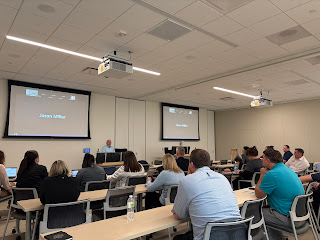UI EMHA First Semester: A Physician, a Pharmacist, a Financial Analyst, and a Manager Walk Into a Bar...
By: Sean Boarini, EMHA Candidate 2018
 Our adventure began with a half-day orientation in the height of the summer heat, when 11 of the 12 class members (Tatiana had just had a baby!) met for the first time. Like the entire program, the orientation was well organized with a focus on professionalism. We got an excellent idea of what would be expected of us, and what we could expect out of our time in the EMHA program. But most importantly, we introduced ourselves to each other and began a dialogue that will likely last throughout our careers.
Our adventure began with a half-day orientation in the height of the summer heat, when 11 of the 12 class members (Tatiana had just had a baby!) met for the first time. Like the entire program, the orientation was well organized with a focus on professionalism. We got an excellent idea of what would be expected of us, and what we could expect out of our time in the EMHA program. But most importantly, we introduced ourselves to each other and began a dialogue that will likely last throughout our careers.The first semester has been challenging. Getting back into studying, reading, writing (“write tight” as Ian says!), and academic work is new again to most of us who have not been in an academic setting for many years. Adding 4 hours of classroom time and 20 hours of schoolwork per week to schedules that already include hectic full-time jobs, family responsibilities, social obligations, and all the unplanned interruptions of daily life takes careful planning and diligence. The highly structured syllabi from our instructors and the excellent introduction to the program set the stage, but you don’t really know what it takes until you are neck deep in it. Luckily the program “forced” us to jump right in, and after a short time we knew exactly what to expect. Group projects both in and out of class gave us the opportunity to get to know one another and understand how our classmates’ diverse experiences could contribute to finding solutions to specific challenges at work and in the classroom.
The introductory courses offer exposure to a wide range of healthcare management topics – from healthcare finance to data-driven operational improvements, to general management philosophies and techniques. The most compelling discussions involve real-life situations taken from our instructors’ experiences, the current news cycle, our ethics casebooks, and situations brought up by fellow class-members. Every week there are robust discussions of these issues. Our cohort boasts a broad range of experience, and the diversity in the classroom gives a feeling that any problem can be fully addressed by surrounding it from all sides. Many times these unstructured discussions are so engrossing that they go on well past the time when the day’s agenda said we should have moved on to other topics. Discussions range from broadly theoretical to very specific solutions to real-life problems. Learning how a pharmacist, a financial analyst, a physician, a nurse, an HR manager, a healthcare/housing specialist, and a construction contracting professional all approach the same challenge offers virtually every possible solution and makes for tremendous conversations. I am lucky to have this group to bounce ideas off of, to learn from, and to support each other through a period of intense professional development.
The EMHA curriculum does a fantastic job of giving us a fundamental understanding of how the best healthcare organizations are managed, how to thrive in a rapidly changing healthcare environment, and how to manage specific issues from a solid foundation of managerial theory. The real-life experiences of our instructors provide a nearly endless resource from which to draw lessons. Sometimes learning what doesn’t work is even more valuable than what might work. But the real strength of this program is the composition of the class. Every week I look forward to getting together with my classmates to expand my understanding and broaden the scope of my thinking. The class delivers time and time again. The work can be intense and persistent focus is required, but I have not felt this to be overwhelming or even a burden. I already feel that, when the program comes to an end with graduation, I will miss the time I get to spend with these people. It is a rare opportunity to have regular interaction with such a motivated and bright group of peers (and instructors!) who bring such a broad and informative range of experiences with them each week. I find myself trying to squeeze every drop of learning I possibly can out of it. I only hope I am contributing at least a fraction of what I am taking from our weekly time together.
I was told that the 2 years in this program would “fly by” and that has certainly been the case so far. Taking a short break at the end of the semester has allowed the chance to reflect on what we have accomplished in a short time. I have already taken specific communicative and managerial tips from the materials and my classmates and improved my job performance. I have a much better understanding of the entire spectrum of healthcare delivery than I did only 4 months ago. After a brief break and holiday celebration with my family, I am looking forward to diving back in as soon as the second semester starts. Bring it on!



Comments
Post a Comment